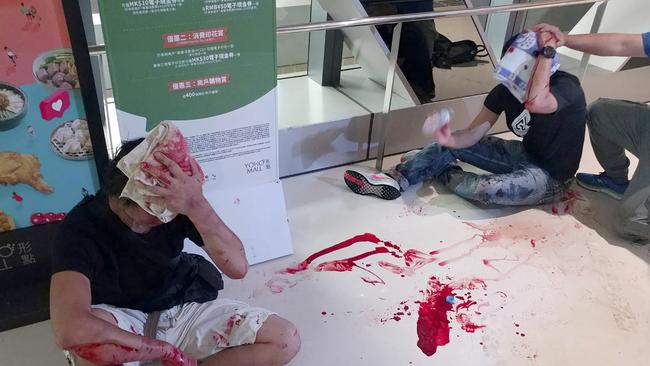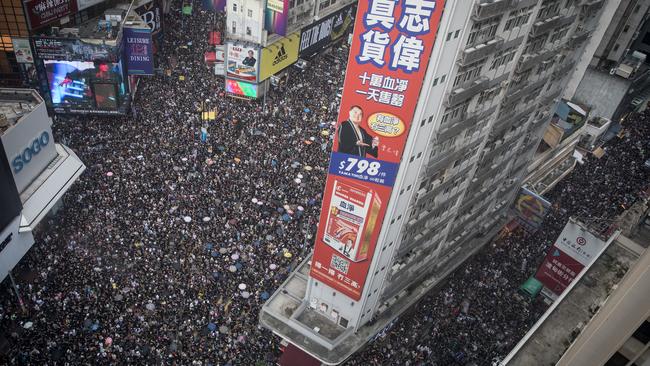Police raid triads after claims they ‘let gangster thugs beat up protesters’
Police have raided triad strongholds after claims they turned a blind eye as thugs attacked protesters.

Hong Kong’s leader has been accused of colluding with criminals after suspected triad gang members attacked protesters travelling home by train from an anti-government rally.
Witnesses said that police took two hours to respond to the violent incident at a station close to Hong Kong’s crossing point to mainland China.
At least 45 people were injured, among them a pregnant woman. One person was said to be in a critical condition.
Carrie Lam, the chief executive, denied that police had turned a blind eye to the attack in which white-clad men beat passengers at Yuen Long station with clubs and poles. No arrests were made in the immediate aftermath.
On Monday night, police began a series of raids on the suspected attackers’ strongholds.
Initially, police had said they could not identify the perpetrators but photographs taken by passers-by showed officers apparently walking alongside and chatting with the assailants.
“Last night the 999 reporting hotline would not connect for a long time and the police station was closed,” a statement by 24 pro-democracy MPs said. “There were even police officers who pretended they didn’t see the actions of those in white shirts and red ribbons, and turned around to leave.
“The police, who are like the servants of triads, have completely lost the public’s trust, forcing people to defend themselves. The situation makes people wonder if Carrie Lam received instructions from the [Chinese Communist] party to cause divisions among the public.”
Ms Lam dismissed the claim, saying: “It’s groundless for anyone to accuse the government of colluding with attackers,” she said. “Their behaviour was infuriating. We absolutely do not allow and tolerate such behaviour. I have already requested the police commissioner spare no effort in arresting the attackers.”

She added: “Violence is not a solution to any problem. Violence will only breed more violence, and at the end of the day the whole of Hong Kong and the people will suffer as a result of the loss of law and order. I call on all sectors and the public to safeguard the rule of law and say no to violence.”
Triad raids
On Monday night, police in Hong Kong began a series of raids on the suspected attackers’ strongholds, including members of the 14K and WO Shing WO gangs.
According to the South China Morning Post, dozens of triad members were targeted by police, including the leader of one group said to hold the rank of “red-pole fighter” — a senior triad member who acts as an enforcer. The raids were expected to last several days. At least four people were arrested.
Ms Lam condemned the protests that preceded the station attack, in which demonstrators defaced the Chinese national emblem at the mainland government’s office in Hong Kong. Eggs were thrown at the symbol, which was also sprayed with black paint and daubed with obscenities.
Ms Lam said that the vandalism was a challenge to China’s sovereignty and undermined the “one country, two systems” arrangement under which the former British colony, handed over in 1997, enjoys certain freedoms and autonomy but remains part of China. The message was repeated by Beijing.
Geng Shuang, a spokesman for the Chinese foreign ministry, urged the Hong Kong government to “take all necessary measures … to safeguard the rule of law in Hong Kong and to severely punish criminals.”
The attacks have fuelled fears that China’s military may intervene. The 74th Army Group, an army brigade, said that it had held an “anti-terrorism” exercise in southern Guangdong province yesterday (Monday). No further information was released on the exercises in Zhanjiang city, 250 miles south of Hong Kong.
Yue Gang, a retired Chinese army colonel and military analyst, said that troops would be dispatched to the semi-autonomous territory if needed. “To deface the Chinese national emblem is like acting as an enemy to 1.3 billion Chinese people,” he said. “They must be deterred. Military curfews can be considered here now that the liaison office got attacked. Tolerance has its limit.”
Hu Xijin, editor-in-chief of the state-run Global Times, warned against military intervention. “If the People’s Liberation Army helps to stabilise the situation, Hong Kong will benefit from law and order, but the public opinion won’t buy it,” he wrote on Weibo, China’s version of Twitter.
The Hong Kong protests were prompted by plans to introduce a law allowing extraditions to mainland China. Ms Lam, reacting to the protests, has declared the extradition bill dead, but unrest has continued. The protesters say that Hong Kong is experiencing a steady erosion of civil rights, leading to calls for electoral reform and an investigation into alleged police brutality.
Growing inequality, rising rents and stagnating wages have contributed to the public discontent. Hong Kong’s 7.4 million citizens face costs of living that are among the highest in the world, with house prices tripling over the past decade. Taiwan, the self-ruling territory Beijing is determined to reclaim, said that Ms Lam and Hong Kong’s leaders should grant universal suffrage to end the protests. Joseph Wu, the foreign minister, said that it was “sad to see the rule of law eroding and the divide between the people and the government widening in Hong Kong”.
He added on Twitter: “The way forward is genuine democratic elections, not violence in the streets & MTR stations. The freedom and human rights of the people must be protected!”
ANALYSIS — Richard Parry
“It had, until this weekend, seemed entirely possible that the dramatic democracy protests that have convulsed Hong Kong all summer had slowly begun to run out of steam.
Numbers at the rallies have been declining, and the storming of the Hong Kong parliament on July 1 shocked many law-abiding residents — but the campaign has been given new life by the attack at Yuen Long station.
Gangs of thugs in white T-shirts, armed with sticks of bamboo and metal, battered protesters in crowded trains, leaving dozens with broken noses and split cheeks, or worse. Some wore masks but others made no attempt to disguise their identity.
As shocking as the attacks was the attitude of the Hong Kong police: some witnesses reported that, despite several calls, it took as long as two hours for officers to arrive. They made no arrests, but were seen strolling alongside the stick-carrying thugs.
The assumption of many is that the thugs were hired, perhaps not directly by the authorities, but with their tacit approval.
The use of enforcers and “security guards” by mainland China has a history: men like the ones who cracked heads on Sunday were seen at the suppression of previous protests in Hong Kong in 2014.
According to Lynette Ong, a political scientist at the University of Toronto, the Chinese authorities use such people to apply violent solutions to delicate situations.
“The government is most likely to use ‘thugs for hire’ when it is carrying out illegal actions or unpopular policies, such as evicting farmers from their properties, or intimidating petitioners and dissidents,” she wrote on the Hong Kong Free Press website.
The intention may have been to intimidate the many law-abiding Hong Kongers, including children, who have taken part in previous marches without any fear of encountering violence. Whether it will have this effect, or further inflame anger towards Carrie Lam and her political masters in Beijing, remains to be seen.”
The Times



To join the conversation, please log in. Don't have an account? Register
Join the conversation, you are commenting as Logout